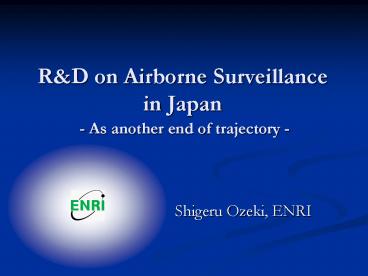R - PowerPoint PPT Presentation
1 / 15
Title:
R
Description:
Airports on the shore with small and complex airspace. FUKUOKA FIR. East end of Eurasia Continent. Stabilized flow to hub AP by ATFM Dep. Con. NOPAC ... – PowerPoint PPT presentation
Number of Views:14
Avg rating:3.0/5.0
Title: R
1
RD on Airborne Surveillance in Japan - As
another end of trajectory -
- Shigeru Ozeki, ENRI
2
Contents
- Japanese Airspace
- Special considerations
- Possible ASA in Japan
- Expected benefit
- RD Activities in Japan
- Issues and some results of trials and simulations
- Future plan by JCAB
- Future plan for ENRI RD
3
Japanese Airspace The Bundling Point
JCAB, MLIT, JAPAN
East end of Eurasia Continent
Parallel Air routes aligned to in-line islands
Shared by international and domestic FLTs
Stabilized flow to hub AP by ATFM Dep. Con.
NOPAC
Oceanic Airspace w/o GS
Earthquake, Volcano, Typhoon and Unstable wind
Airports on the shore with small and complex
airspace
Turbulence by monsoon and high mountain
FUKUOKA FIR
4
Traffics in Japanese Airspace
About 1.7 times of traffic
Data from JCAB, MLIT, JAPAN
5
Possible ASA in Japan
UNDER INVESTIGATION
Mitigation of the effect by local break down of
ATM
- Falling into disorder by natural and artificial
reasons - Less tolerant bundling airspace propagates the
breakdown - Improvements of ATM supports first, but not
enough - Low quality of input info. (When earthquake will
happen ?) - Expectation to ASA with new separation mode
- Shorter cycle time of ASA may permit shorter
separation - Wider tolerance is expected by shorter separation
standard - No-action or less action CP have less damage for
trajectory - ITP, ITF and ITM will give more options in
oceanic airspace - Less workload will give more chance to recover
from disorder
Flexible Local Tactics may help global strategy
6
Possible ASA in Japan
UNDER INVESTIGATION
Throughput, Fuel Efficiency and Mitigation means
- Needs to support the future traffic in Japanese
airspace - To increase the throughput of airspace,
especially in hub area - To improve the fuel efficiency and to reduce
flight time - Higher throughput and fuel efficiency by ASA, for
example, - ASA in oceanic airspace (ITP)
- Gate-to-gate optimization including en-route
(ITM) - Less separation at crossing for less impact to
trajectory(CP) - MS without waiting circle for ATFM environment
- Less workload by task sharing with GSA (Cluster
control ITF) - ASA to mitigate the risk
- Basic improvements of situation awareness (ATSA)
- Possible improvements with graphic HMI for ASA
with CDTI CPDLC - ATM compatible ACAS as another layer for
safety-net
7
AS RD in Japan ENRI
From Radio Engineering to System Studies
- Developments of BCAS since early 70
- Toyocom-ENRI projects with ATCRBS signals before
mode S - Toyocom-BCAS laid part of foundations of ACAS and
TCAS - Contribution to ACAS standardization in ICAO
- Flight test for signal compatibility in Japan
- Evaluating ACAS algorithm for its compatibility
with airspace - Operational monitoring activities
- Studies on ASA in addition to CAS applications
- Onboard measurement for 1030/1090 signal
environment - ADS-B experiments
- Exchanges at ICAO/ASP, RFG, ADAS-DUG and ASAS-TN
8
Issues on 1090 Signal Environment
UNDER INVESTIGATION
Unexpected transmissions may degrade 1090 MHz
environment
Missing to detect this pulse
1030 MHz Receiver Log-Video Output
MTL
S. Ozeki, et. al. "WG-A Discussions on Reply
Failure to Low Power Interrogations",
SCRSP/WG-B/WP/B9-13, October, 2005
9
RD in Japan FHI
For ATM compatible aircraft by SUBARU
- Fuji Heavy Industries, Aerospace Company
- Multi Clustered Air traffic Management (Pat.
Pend) - Viewing Aircraft as dynamic clusters
- Applications of optimal algorithm to trajectory
search - Integrate ASA with trajectory control (SM, VSA,
ITF?) - Presentation at ADAS-DUG meeting, Sep. 09
- Cooperated ASA/GSA with MCAM reduces
- HDG-CHG inst. in heavy traffic condition by 10-40
- FLT time in almost all condition by 10
- Works will be needed to improve the simulation
model
10
RD in Japan KHI-FURUNOJoint trial with
Kawasaki BK-117
Domestic ASA for Rescue mission and
Doctor-heli. trials
Data link Antennas
Display
Transceiver Processor
GPS Antenna
GPS Data link System
11
JAXA NOCTARN (2001-2005)
- Research Objectives
- Construct self-organized trajectory-based
operations system for small aircraft, and
demonstrate by flight experiment with multiple
aircraft. - Operations Concept
- Based on shared state vector and intent
(trajectory), approaching traffic are
self-sequenced and separated without controller. - The CDTI finds conflict-free trajectory and
advices pilots. Once the trajectory is assigned,
ref-speed is advised to keep separation.
Traffic Symbol
Information of Focused Traffic
Landing Sequence
Ownship
12
JAXA NOCTARN Flight Test Results
Trajectory is modified to avoid excessive bank
angle by wind
Calm
North Wind
North wind
Wind calm
13
Future plan in Japan JCAB
Words at ICAO meeting on SESAR and NextGEN, Sep.
2008
- Japan is ready to work with others in
expectation of ICAOs leadership - Japan is undergoing a development phase of
Long-term Roadmap of Future Air Traffic Systems
in 2025 to complete in 2010. - Process involves stakeholders of operators,
academy, manufacturers, research institutes as
well as JCAB, based upon the ICAO Global ATM
Operational Concept.
2010
2025
Planning
Implementations Evaluations
ATM operation
14
Future plan for ENRI RD on ASA
2010
2025
Planning
Implementations Evaluations
ATM operation
JCAB
To develop RSP and to support ICAO SARPs
standardization To support the development for
ASA/ATM compatible ACAS
To support JCAB at planning and control of signal
usage incl. AS
2010
2022
Prep.
Mainly for ATSA
Monitoring and Improvements ?
Mainly for ASPA
ASA for ATM
ENRI
Signal Environment Measurement and Estimation
Monitoring and Improvements ?
15
Conclusion
- Japan is ready to work proactively with others
in expectation of ICAOs leadership (JCAB) - Japan is undergoing a development phase of
Long-term Roadmap of Future Air Traffic Systems
in 2025 to complete in 2010(JCAB) - RD activities are undergoing in Japan to prepare
for ASA for domestic special mission and for
global ATM implementation































